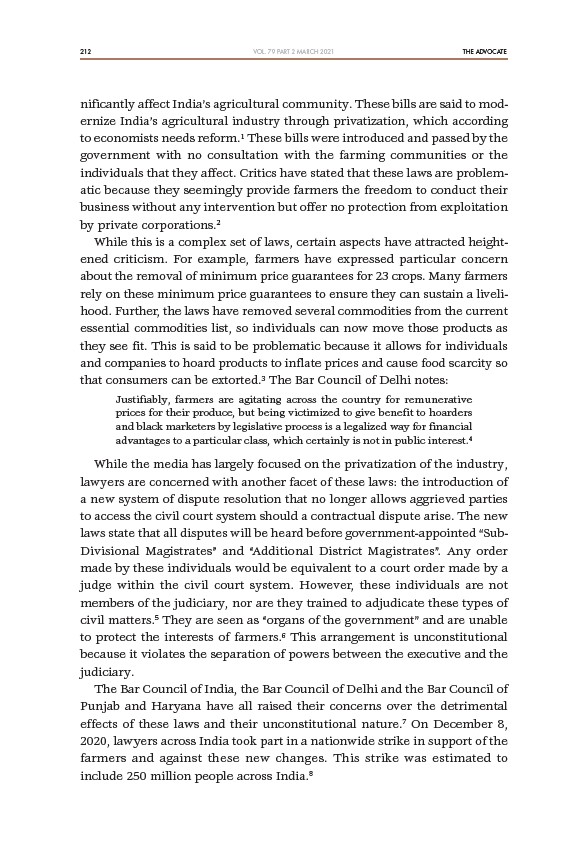
212 THE ADVOCATE
VOL. 79 PART 2 MARCH 2021
nificantly affect India’s agricultural community. These bills are said to modernize
India’s agricultural industry through privatization, which according
to economists needs reform.1 These bills were introduced and passed by the
government with no consultation with the farming communities or the
individuals that they affect. Critics have stated that these laws are problematic
because they seemingly provide farmers the freedom to conduct their
business without any intervention but offer no protection from exploitation
by private corporations.2
While this is a complex set of laws, certain aspects have attracted heightened
criticism. For example, farmers have expressed particular concern
about the removal of minimum price guarantees for 23 crops. Many farmers
rely on these minimum price guarantees to ensure they can sustain a livelihood.
Further, the laws have removed several commodities from the current
essential commodities list, so individuals can now move those products as
they see fit. This is said to be problematic because it allows for individuals
and companies to hoard products to inflate prices and cause food scarcity so
that consumers can be extorted.3 The Bar Council of Delhi notes:
Justifiably, farmers are agitating across the country for remunerative
prices for their produce, but being victimized to give benefit to hoarders
and black marketers by legislative process is a legalized way for financial
advantages to a particular class, which certainly is not in public interest.4
While the media has largely focused on the privatization of the industry,
lawyers are concerned with another facet of these laws: the introduction of
a new system of dispute resolution that no longer allows aggrieved parties
to access the civil court system should a contractual dispute arise. The new
laws state that all disputes will be heard before government-appointed “Sub-
Divisional Magistrates” and “Additional District Magistrates”. Any order
made by these individuals would be equivalent to a court order made by a
judge within the civil court system. However, these individuals are not
members of the judiciary, nor are they trained to adjudicate these types of
civil matters.5 They are seen as “organs of the government” and are unable
to protect the interests of farmers.6 This arrangement is unconstitutional
because it violates the separation of powers between the executive and the
judiciary.
The Bar Council of India, the Bar Council of Delhi and the Bar Council of
Punjab and Haryana have all raised their concerns over the detrimental
effects of these laws and their unconstitutional nature.7 On December 8,
2020, lawyers across India took part in a nationwide strike in support of the
farmers and against these new changes. This strike was estimated to
include 250 million people across India.8